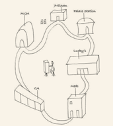Notes Taken During our Meeting to Discuss the Podcast
We had two meetings in preparation for our Podcast . The first meeting was on Teams on the 08th of May 2023 at 18h30. Where we roughly discussed how are we going to do the podcast and we all came up with ideas around the Podcast. Our second meeting was on the 10th of May 2023 in our everyday lecture venue and lecture time. This is where we discussed and practiced how the podcast will go. We agreed that each person must come up with two or more questions to ask during the podcast after they have given an overview of what their books are about. We also agreed that during our introduction we will give a bit of background about what is our individual research proposal about. Below are my questions for the podcast: 1. Who are the experts ? 2. Who is on the receiving end, who has excess to these technologies and Why? Good afternoon, My name is Lerato Priscila Sauhatsi. I had done my undergraduate studies at the University of Pretoria with majors in Psychology and Sociology. I am current...


